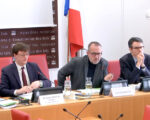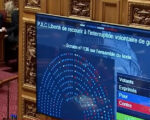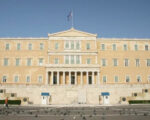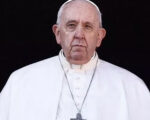>> Putin’s War on Pillows
Un festival du livre se tient depuis mercredi à Moscou. Le Moscow International Open Book Festival accueille de nombreuses manifestations, dont des pièces de théâtre. Deux d’entre elles ont été censurées.
L’information est rapportée par le New Yorker : les organisateurs du Moscow International Open Book Festival ont reçu deux jours avant le début de la manifestation une lettre à en-tête de Vladimir Aristarkhov, numéro deux du ministère de la Culture. Il demande l’annulation de deux pièces programmées pendant le festival. L’une d’entre elles, Herbivores de Maxim Kurochkin et Talgat Batalov, est une pièce de théâtre contemporain manifestement centrée sur la sexualité, décrite par un critique du Moscow Times comme «un conte de fée sous stéroïdes». L’autre pièce, intitulée L’âme d’un oreiller est un spectacle de marionnettes pour enfants.
La pièce se situe dans une crèche, et les personnages sont des oreillers. Masha Lipman, correspondante du New Yorker à Moscou, décrit l’action: «L’un d’entre eux est différent: il est fourré avec des cosses de blé noir au lieu de plumes. Il y a un petit trou dans sa taie et il a peur d’être mis à la poubelle, mais il finit par se lier d’amitié avec un petit garçon, solitaire lui aussi. »
Le ministère de la Culture a demandé le retrait de la pièce en ces termes: «Selon nos informations, dans la pièce L’âme d’un oreiller, on peut déceler des éléments de propagande homosexuelle à l’intention des mineurs. (…) Le contenu de ces deux pièces entre en conflit avec les valeurs morales traditionnelles acceptées dans la culture Russe.» La lettre met en garde les organisateurs: «Dans l’éventualité où ces deux productions ne seraient pas annulées, le ministère de la Culture retirera son soutien de parrain officiel à cette manifestation.»
« Malheureusement, les tentatives du gouvernement pour contrôler la vie culturelle ne sont plus une surprise, même si cela ne les rend pas moins absurdes et choquantes. »
L’éditeur pour enfants KompasGid
La menace ne semble pas si terrible. Pourtant, les organisateurs ont choisi d’annuler les pièces incriminées. Une occasion pour la correspondante de rappeler les dernières avancées de la censure en Russie. Depuis le vote des lois anti-gay de l’été 2013, il y a tout juste un an, le gouvernement de Vladimir Poutine a pris le virage du conservatisme social. En ce qui concerne la culture, de nombreux signaux vont dans ce sens: Masha Lipman rappelle l’interdiction d’un livre scolaire qui mentionnait des personnages de contes de fée occidentaux. Des administrateurs locaux ont proposé de contrôler les livres disponibles en librairies. Nous avions relevé sur Le Figaro.fr la tentative de Vladimir Poutine de museler les artistes contestataires en interdisant l’usage de l’argot. Un critique d’art célèbre a été renvoyé de son poste de conservateur du pavillon Russe à la Biennale de Venise, tandis qu’un historien a dû quitter son université, tous deux pour les mêmes raisons: ils avaient critiqué l’annexion de la Crimée.
Un élan de solidarité a cependant suivi cette énième censure. Des participants du festival du livre ont exprimé leur mécontentement en annulant leurs propres événements, dont la revue de référence Novoe Literaturnoe Obozrenie (Nouvel Observatoire Littéraire) et l’éditeur pour enfants KompasGid, qui a déclaré dans un communiqué que «malheureusement, les tentatives du gouvernement pour contrôler la vie culturelle ne sont plus une surprise, même si cela ne les rend pas moins absurdes et choquantes.» Selon la correspondante du New Yorker, d’autres revues, mais aussi des auteurs et des personnalités du monde de la culture ont refusé de participer au festival.
>> The Moscow International Open Book Festival is an annual event in which writers, poets, translators, graphic designers, and publishers meet with readers in tents outside a large exposition hall. There are also dance and music performances and workshops. Cookbook authors offer freshly prepared food. There is a children’s book program and there are plays. This year, two puppet productions caught the attention of the government. One, “Herbivores,” had been described by a critic as “a kind of fairytale on steroids.” The other, a children’s show called “The Soul of a Pillow,” is set in a nursery school, and the characters are children’s pillows. There’s one that is different—filled with buckwheat hulls instead of down and feathers. It has a hole in it, and is afraid that it will be discarded as garbage, but it is eventually befriended by a boy, also a loner.
On June 9th, two days before opening, the festival received a letter on the official stationery of Vladimir Aristarkhov, the First Deputy Minister of Culture. “According to available information, in the play ‘The Soul of a Pillow’ one may discern elements of propaganda of homosexuality among minors,” he wrote. “The play ‘Herbivores’ has foul language. The content of both plays is in conflict with traditional moral values accepted in the Russian culture.” The letter warned, “In the event that these items are kept in the program, the Ministry of Culture will withdraw its consent to feature as an official patron.”
Given the absurdity of the reprimand, the government’s threat to withdraw its patronage may seem laughable, but, as Vladimir Putin’s regime has stepped up constraints on self-expression, Russians are reacting by and large with submission, not resistance. The festival’s organizers were no exception. They agreed to remove the productions from the program.
This month marks the first anniversary of the infamous anti-gay bill, which I have written about before. It bans “propaganda of nontraditional sexual relations” among minors—part of the Kremlin’s general shift toward social conservatism. Since Putin has repeatedly emphasized Russia’s “traditional values” as a safeguard against the immoral and decadent West, scores of aggressive loyalists have rushed to vilify and condemn unpatriotic Russians who share Western values or who are just too modern and independent-minded, whether in art, culture, or politics. Kirill Serebrennikov, an innovative Moscow theatre director, says he has been barred from guest tours in the provinces. A primary-school math textbook was pronounced unfit, because it mentions characters from Western fairy tales. Local administrators have come up with suggestions (so far mostly declined) for determining which books should be removed from libraries. A member of the Public Chamber, a government-organized civic assembly, called for the use of a single, approved schoolbook of Russian literature, so that children won’t be exposed to unwanted ideas. Russia’s brilliant art critic Grigory Revzin was recalled from his position as curator of the Russian pavilion at the Venice Biennale, and a prominent historian, Andrey Zubov, was fired from his university—in both cases for criticizing the annexation of Crimea.
This week, as news of the Culture Ministry’s “Pillow” ultimatum spread, a large group of the festival’s participants, in a rare instance of solidarity, resisted. “We are saddened to announce that we are cancelling our presentations,” a respected publishing house, Novoe Literaturnoe Obozrenie (“New Literary Review”), said in a statement. “We can’t afford not to react to the Ministry of Culture’s attempts … to establish censorship and decide what is in conformity with ‘Russia’s traditional moral values.’ ” Memorial, an organization that has been engaged in human rights, historical research, and education for many years, also condemned the Ministry’s letter. A children’s-book publisher, KompasGid, stated, “Unfortunately, the government’s attempts to regulate cultural life are no longer a surprise,” and added, “But this doesn’t make them any less absurd or outrageous.”
Several other publishers, along with authors and cultural figures, have refused to participate in the event, as well. Many said they would move their events to alternative venues. The Open Book Festival has become a festival of civic disobedience.
The festival opened on Wednesday, as scheduled, but a notice appeared on its Web site: “ATTENTION! Dear guests of the festival! For reasons beyond our control, changes have been made in the festival’s program. Please, be careful and check the program on the Web site.” Those who refused to participate held their events in a large downtown café, in Memorial’s own offices, or at the Andrei Sakharov Center.
Alternative venues may still be found in Moscow, but, as Putin’s government clamps down on freedom of expression, the public realm—in art and culture, civic organizations, and nongovernment media—is shrinking by the day. The trend will almost certainly continue, and calls to mind many earlier periods of repression in Russian and Soviet history. “The aggressive, hard, dense cultural and psychological environment that has emerged is forcing people of a certain state of mind to raise their hands and admit: I can’t bear it anymore,” Alexander Gorbachev, the thirty-year-old editor of Afisha, Russia’s best arts and culture magazine, said in an interview. He has quit his job and is about to leave the country.










